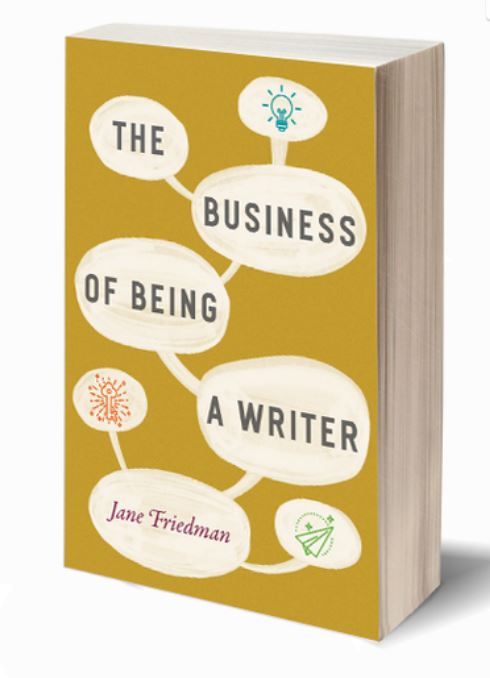 by Elizabeth S. Craig, @elizabethscraig (with content from @JaneFriedman)
by Elizabeth S. Craig, @elizabethscraig (with content from @JaneFriedman)
I receive one or two emails a month from new writers asking for information and help in either publishing or promoting their book.
It’s happened enough that I have a detailed ‘canned response’ email that I’ve written to give details and resources to these writers. The main resource that I reference is Jane Friedman’s blog, in particular her collection of articles titled “Start Here.” One is Start Here: How to Self-Publish Your Book and another is Start Here: How to Get Your Book Published.
So when I was offered a complimentary ARC of Jane’s new book (publishing today, March 16), The Business of Being a Writer, I eagerly accepted it. As expected, it’s jam-packed with savvy information for writers. One common issue I notice in writers is a certain amount of business insecurity, a fear of making a mistake. This is a reference to help keep writers of all levels of experience from making a mistake.
One important note is that this book, unlike many others that I’m familiar with on the market, encompasses the writing business in its entirety. It doesn’t stop with writing books. This is also an excellent resource for anyone interested in supplementing their novel-writing or nonfiction income with freelancing in its different forms. There’s also an entire section on ways for writers to make money, including grants, contests, affiliate income, and teaching and online education.
I was fascinated reading Jane’s section overview on understanding the publishing industry: trade book publishing, magazine publishing, online and digital media, and 21st century literary publishing.
The book offers help with finding a traditional publisher (small and large), pursuing self-publishing, and promoting published books.
Here is an excerpted piece from Jane’s book on researching small presses. She recommends seven questions for writers to ask (with more detail offered in the book):
Where are the books distributed?
Does the publisher invest in a print run or use print-on-demand only?
For digital-only publishers, what value do they provide that you need?
What’s the publisher’s editing process like? Will you be assigned an editor?
What marketing and promotion do their titles receive?
How can you terminate the deal?
Can you speak to recent authors?
Obviously, Jane Friedman is a go-to resource for me and her blog is the place I send new writers to the most. What resources do you depend on? Read any helpful books for writers recently?
The Business of Being a Writer:
Available at:
Amazon
Barnes and Noble
IndieBound
Sounds like it really covers every aspect.
It’s very complete. Hope you have a good weekend, Alex!
Thanks for sharing this, Elizabeth. It sounds like it really has a lot of useful, practical information for writers. And writers can always benefit from accessible, practical resources for help.
Especially with so many aspects of the business to consider. Thanks for coming by!
Thank you, Elizabeth! You’re a tremendous resource for writers, so I’m extra grateful for the mention
You’re very welcome! I was happy to spread the news about such a useful resource. And thanks!
It would be nice if this list had context for each question. Some are not readily apparent, and may even be misplaced.
For instance, if a small press does not invest in a print run, and instead uses POD, is that a bad thing? The quality of POD vs offset is getting closer, and most readers can’t tell the difference. Certainly, most self-publishers themselves don’t use offset, and many traditional publishers use POD.
Further, an investment in a print run carries risk. that doesn’t sell puts the small press at a greater financial risk – they’ll be sitting on expensive stock and funds won’t be available for other purposes, including advances, investment in design, marketing, etc.
Thanks for coming by. The book carries a good deal more context and it’s my fault that it’s not included in the post (I didn’t want to give away too much).
Specific to print runs, Jane writes:
“POD is a technology that allows publisher to print their books one at a time, as they are ordered. Your book is unlikely to be stocked on physical store shelves unless the publisher invests in at least a small print run. A print run also represents an investment and indicates some commitment to selling and marketing a book. Ask the publisher what its typical print run is; most publishers will commit to a minimum of 500 or 1,000 copies of any title they publish. ”
I think that lack of a print run isn’t necessarily a negative, but is important for writers to know upfront. That’s why it’s listed in the questions.
Thanks again!
Hello: This expands on my questions about small publishers:
https://www.janefriedman.com/evaluate-small-publisher/
Thanks, Jane!
And I can answer six of those questions. Seven if you count the couple titles we have that are digital only.
I know a lot of publishers have digital only lines. Penguin Random House had one when I was still writing for them…romance and mystery, I think.
Thanks, Elizabeth! I signed up for her newsletter and will be getting the book next week.
I love her newsletter and I think you’ll find the book really helpful!
Hi Elizabeth – I’d spotted her book – so am very glad to read your review and to see your extra notes here in the comments. You’re my go to resource! Enjoy St Patrick’s Day weekend – if the weather allows! Cheers Hilary
Thanks! It’s a beautiful day…70 degrees F and partly sunny. Planning on going out for dinner! Hope you enjoy your day and weekend. :)